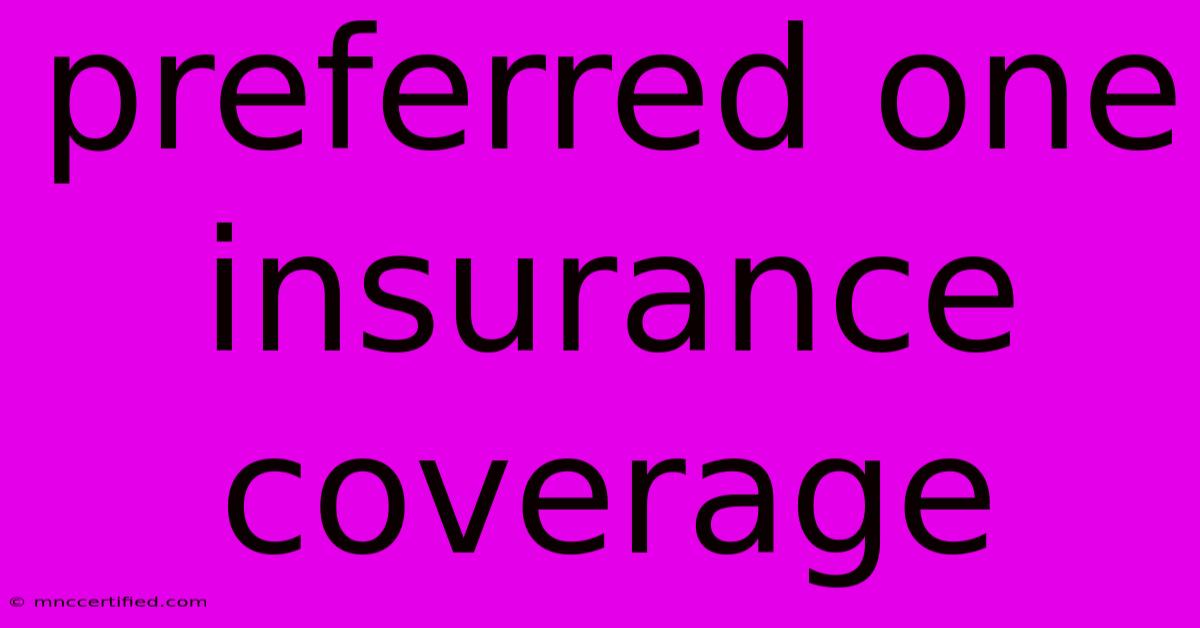Preferred One Insurance Coverage

Table of Contents
Understanding Preferred Provider Organization (PPO) Insurance Coverage
Choosing the right health insurance plan can feel overwhelming. One popular option is a Preferred Provider Organization (PPO) plan. This article will delve into the intricacies of PPO insurance coverage, helping you understand its benefits, drawbacks, and whether it's the right fit for your needs.
What is a PPO Plan?
A PPO, or Preferred Provider Organization, is a type of health insurance plan that allows you to see any doctor or specialist you choose, in-network or out-of-network. However, you'll typically pay less if you stay within the PPO's network of providers. This network is a group of doctors, hospitals, and other healthcare professionals who have contracted with your insurance company to provide services at a negotiated rate.
Key Features of PPO Plans:
- Flexibility: The biggest advantage is the freedom to see any doctor. While you'll save money by using in-network providers, you aren't restricted to a limited list.
- No Referrals Needed: Unlike some HMO plans, you generally don't need a referral from your primary care physician to see a specialist.
- Higher Premiums: PPO plans usually come with higher monthly premiums compared to HMOs or other managed care plans.
- Higher Out-of-Pocket Costs: While offering flexibility, out-of-network care can significantly increase your out-of-pocket expenses. Expect higher co-pays and deductibles when using out-of-network providers.
- Copays and Deductibles: You'll still have copays (a fixed fee you pay for each visit) and a deductible (the amount you pay out-of-pocket before insurance coverage kicks in) to consider.
Advantages of PPO Insurance Coverage
- Greater Choice of Doctors: You're not limited to a specific network of providers. This is especially beneficial if you have a preferred doctor or specialist outside a more restrictive plan's network.
- No Referrals: The ability to see specialists without a referral saves time and simplifies the process of accessing specialized care.
- More Extensive Network: PPO networks tend to be broader than those offered by HMOs, increasing your chances of finding a provider near you.
Disadvantages of PPO Insurance Coverage
- Higher Premiums: The flexibility comes at a cost. Monthly premiums for PPO plans are often significantly higher than other plans.
- Higher Out-of-Pocket Costs: Using out-of-network providers will result in substantially higher costs, potentially leading to unexpectedly high medical bills.
- Less Cost Control: The lack of a gatekeeper (primary care physician) can lead to increased healthcare spending if you don't carefully manage your care.
Is a PPO Plan Right for You?
Consider these factors when deciding if a PPO is the best choice:
- Budget: Can you comfortably afford the higher premiums and potential out-of-pocket expenses?
- Healthcare Needs: Do you anticipate needing specialized care frequently? If so, the flexibility of a PPO might be crucial.
- Geographic Location: Does a PPO offer a sufficient number of in-network providers in your area?
- Health History: Consider your past and current health conditions. If you expect extensive healthcare needs, the cost implications of both in-network and out-of-network care should be carefully evaluated.
Choosing the Right PPO Plan
Once you've determined a PPO is suitable, carefully compare different PPO plans offered by various insurance providers. Consider factors like:
- Premium costs: The monthly amount you pay.
- Deductible: The amount you pay out-of-pocket before coverage begins.
- Copays: Fixed amounts you pay per visit.
- Out-of-pocket maximum: The maximum amount you will pay in a year.
- Network size and provider availability: Research the doctors and hospitals included in the network.
By carefully considering the advantages and disadvantages of PPO insurance coverage and comparing plans, you can make an informed decision that best fits your healthcare needs and financial situation. Remember to consult with a qualified insurance broker or advisor for personalized guidance.

Thank you for visiting our website wich cover about Preferred One Insurance Coverage. We hope the information provided has been useful to you. Feel free to contact us if you have any questions or need further assistance. See you next time and dont miss to bookmark.
Featured Posts
-
Best Auto Insurance In Hopkinton
Nov 21, 2024
-
Songbird Crypto Price Prediction
Nov 21, 2024
-
Strait Stapleton Cma Stage Surprise
Nov 21, 2024
-
24 20 An Hour Is How Much A Year
Nov 21, 2024
-
Embark General Insurance Payment
Nov 21, 2024